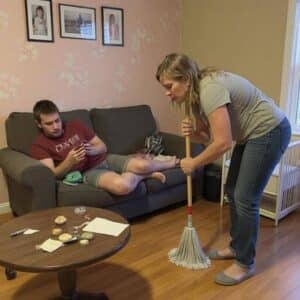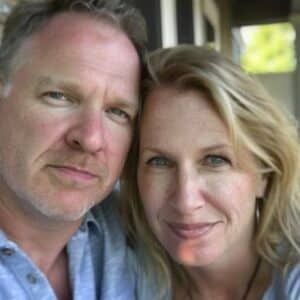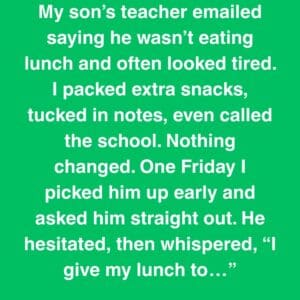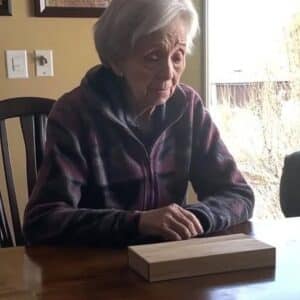I met Elias when I was thirty-nine and certain my life was already mapped out. He was fifty-two—tall, with the kind of calm that made people around him lower their voices. During our first conversation he listened more than he spoke, asked questions instead of offering opinions, and laughed like someone who had nothing to prove. By the time the waiter cleared our coffee mugs, the floor felt steady beneath my feet for the first time in years.
We married a year later beneath paper lanterns in a friend’s garden. Loving him was like finding extra rooms inside a familiar house; every day revealed new space for tenderness. On Sundays he flipped blueberry pancakes, and on Wednesday nights we read aloud to each other. Ordinary moments shimmered.
Three years into that glow he began waking at night with a dull ache in his back. Tests, referrals, a biopsy—then the oncologist delivered a sentence we could barely hear: stage-four pancreatic cancer. The exam room suddenly felt too small for the news it held.
Life became a front-line ward. I learned to program infusion pumps, kept a notebook of medication times, and tracked his weight on a chart taped beside the kettle. Chemo days were grim corridors of waiting, but he squeezed my hand and cracked jokes about the plastic chairs. At home I bathed him, held him when the pain spiked, and read psalms aloud when words failed us. His adult children—Maya the attorney and Jordan the IT specialist—visited now and then, offering brisk excuses about work or saying they wanted to remember him healthy.
He died early one April morning while rain tapped the windows. I held his hand until it cooled and kept whispering long after he was gone.
The funeral passed in a blur of umbrellas, lilies, and polite condolences. Exhausted, I fell asleep in the armchair beside our half-empty bed. At dawn the front door opened. Jordan walked in first, Maya behind him, thumbs flying over her phone.
“We’re putting the house on the market,” he said. “Dad left it to us. You need to be out by Friday.”
Shock rooted me to the sofa. Elias had always promised I would be secure, yet the notarized will Jordan slapped on the coffee table listed every visible asset—the house, bank account, and car—in the children’s names. “You can keep your clothes,” Maya added without looking up. My protest—that I had been Elias’s wife and caregiver—was cut short: “You weren’t our mother.”
Seven days later movers carried the last boxes to the curb. Strangers wandered through rooms where Elias and I had slow-danced in sock feet, praising “charming cedar beams” I had stained myself. As the real-estate agent locked the door, my phone vibrated. Unknown number: Check the storage unit on Fremont. Locker 112. Dad wanted you to have it.
The wording felt unmistakably his. I rented a car and drove across town. The storage facility was a row of steel mouths. The clerk copied my ID, handed me a tarnished key, and pointed down a corridor that smelled of dust and motor oil. Unit 112 contained a cedar chest, three banker’s boxes, and a folding chair—as though someone expected me to sit awhile.
I closed the door, sat on the concrete, and opened the first box. Out spilled snapshots of beach vacations, receipts for diner breakfasts, and love notes scribbled on grocery lists. Beneath them lay a thick bundle of envelopes addressed in Elias’s script.
Dearest Clara, the first letter began. If you’re reading this, I’m gone. I’m sorry for what Maya and Jordan are probably doing. Everything in this unit is yours; it was the safest way to protect it. Forgive my secrecy. I love you beyond anything I ever said aloud. —Elias.
Tears blurred the ink. The second box held a velvet pouch with a pearl necklace, diamond studs, and a bracelet engraved FOREVER YOURS. The cedar chest concealed an envelope marked LEGAL. Inside were deeds to three vacation properties, bank accounts in my name, and a notarized directive transferring them outside probate. Elias hadn’t forgotten me; he had outmaneuvered every obstacle to secure my future.
For the first time since his diagnosis, hope sparked like a match in a dark room.
Within a month I moved to the smallest property—a clapboard cottage on a Vermont lake bordered by sugar maples. I adopted a beagle from the shelter, unpacked my paints, and timed my days by birdsong instead of medication alarms. My nearest neighbor, Ruth, introduced herself with blueberry scones and a laugh that shook her shoulders.
One crisp October evening Ruth noticed the bracelet. I told her everything—love, illness, eviction, the mysterious text, and the hidden fortune. She listened, eyes bright, then said, “He didn’t just leave you money. He left you room to start over.”
She was right. The nest egg Elias crafted gave grief space to breathe rather than suffocate. While sorting the last box I found one more envelope—short, decisive.
Clara, I feared the kids would contest anything left in plain sight. This was the only safe path. Use what I’ve hidden to live boldly. Paint sunsets, rescue dogs, love again when you’re ready. Remember: you were my brightest chapter. All my love, E.
I pressed the letter to my chest and felt warmth spread where only ache had lived.
Loss isn’t fair, and devotion doesn’t guarantee kindness. Yet inside shattered things there is often an unseen doorway—mine was built of cedar and secrecy. Yours may look different, but it exists. When you find it, step through. Second chances wait on the other side.





